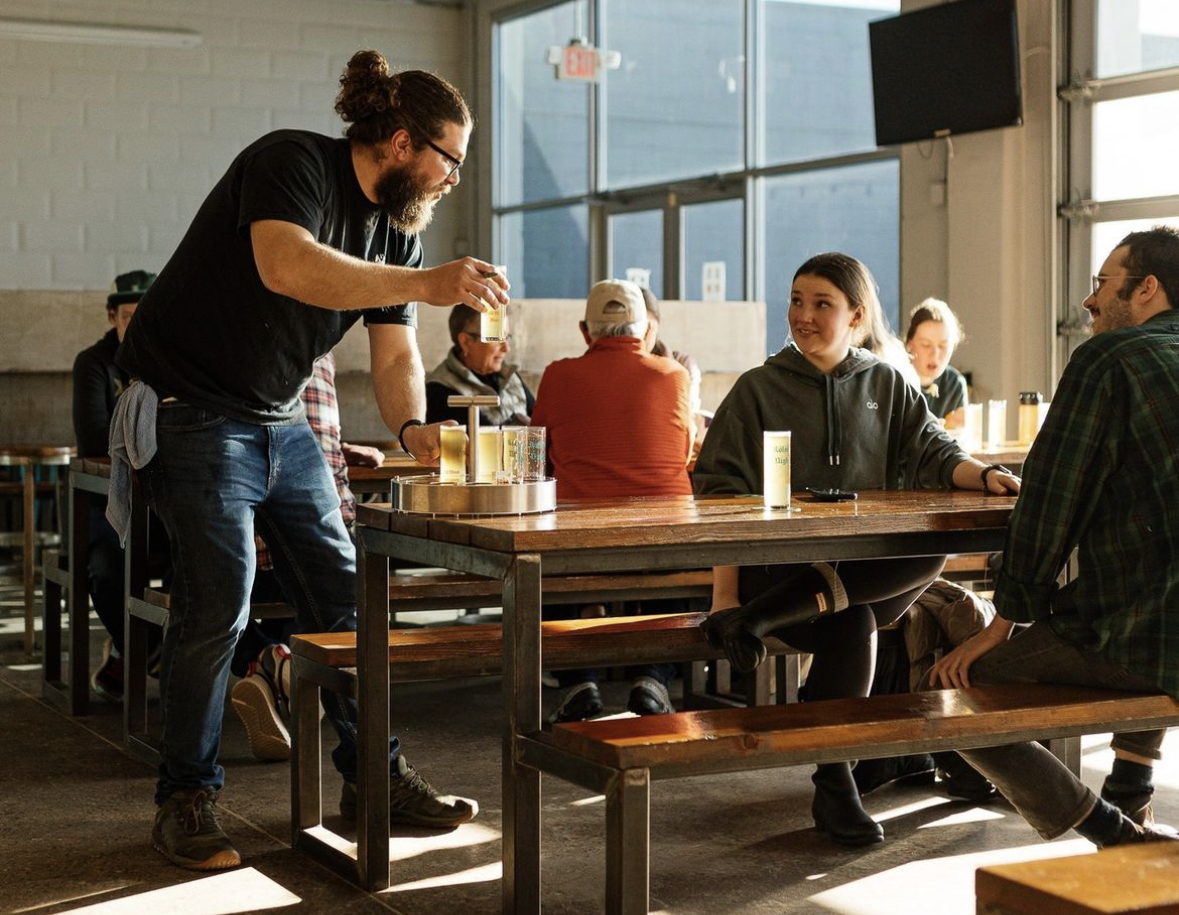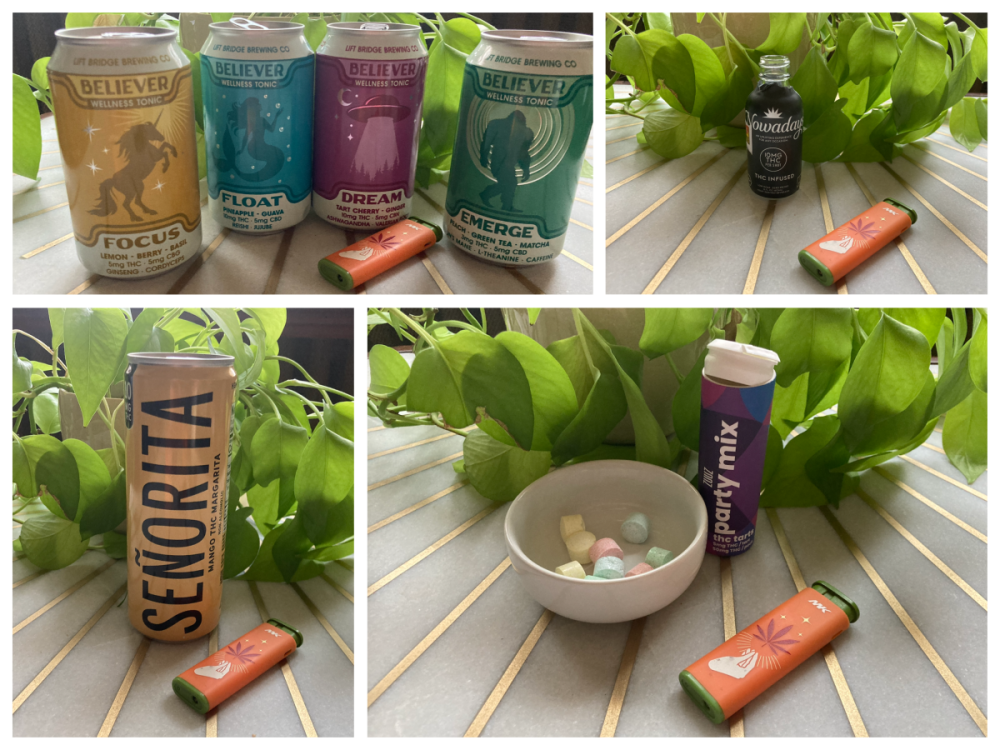Looking around Dual Citizen Brewing Company’s St. Paul taproom on a Sunday afternoon, you might notice something sort of unusual. Much appears as it always does on a pleasant June day—couples convene on the patio, dogs lounge on the floor, and sunlight filters through the wide garage door that opens onto Raymond Avenue.
But what’s with the servers walking around with permanent markers and weird circular trays with wooden handles? What are those small, almost test tube-like glasses dotting the tables? And how are people getting new beers without ever approaching the bar?
This is Dual Citizen’s Sunday Kölsch service, a relatively new recurring event. For Dual Citizen, at least—the service is modeled after Kölsch traditions that have been practiced in Köln (Cologne), Germany for hundreds of years.
Head brewer Bradley Zimmerman has been brewing a Kölsch, Elbow Bender, since he joined Dual Citizen in the fall of 2019. (Like many breweries, they call it a Kölsch-style ale out of respect; in Germany, the strictly defined beer is protected by Kölsch Konvention rules, and limited to about 20 breweries in Köln.) “It wasn’t year-round to start with, but it kind of evolved into that,” he says. “It just sold so well, and people really wanted something lower ABV on the menu as well.”
Last August, the brewery introduced traditional Kölsch service to complement Elbow Bender’s popularity. One Sunday per month, bartenders patrol the taproom with thin glasses called stangen, replacing patrons’ empties without being asked.
A few breweries offered traditional Kölsch service before Dual Citizen’s kicked off last summer, and in the 10 months since theirs started, even more Twin Cities taprooms have introduced it. The local movement mirrors a nationwide trend of breweries from Pennsylvania to Tennessee dutifully filling stange after stange for thirsty guests.
And that’s kind of weird! As a style, Kölsch has always been among the least popular in the country. The traditional service that accompanies it has been rare outside Köln for hundreds of years. So what’s behind the growing Kölsch craze?
You can’t talk about the Kölsch trend in the Twin Cities, or in the U.S. more broadly, without talking about Wild Mind Ales—specifically its head brewer, Austin Myhran. “I can’t take credit for the resurgence of traditional Kölsch service across the country,” Wild Mind co-founder Jason Sandquist replied when reached by email for this story, “but Austin can!”
Myhran studied brewing at the Doemens Akademie in Munich, where his instruction included traveling Europe by bus to visit breweries, hop yards, and malt houses, taking in the beer culture of the whole continent. Part of that time was spent in Köln, where he first visited Kölsch breweries and experienced the traditional service.

“It was something that was so cool to us, because it was so unique—and these breweries are old and gorgeous,” he says. “The service model is designed to sit down, and drink a lot of beer, and keep drinking until you tell them to stop giving it to you, which obviously appealed to a lot of us.”
In Köln, Kölsch is always, always served in a stange (meaning "pole" or "rod”), a thin, cylindrical, 6.8-ounce glass. Servers tote the glasses around in a circular tray called a kranz (“wreath”), which fits roughly a dozen stangen. You don’t have to approach the bar or even a server to order a refill; patrolling beertenders replace each empty or near-empty stange with a full one without being asked, and make a mark on a special coaster (or “deckel”) under your glass to denote each refill. If you’ve had enough, simply place the coaster on top of the empty stange—the server will tally your hashmarks and ready your bill.
The experience stayed with Myhran, who’s always been a fan of European beer styles. In 2021, as he settled into his first few months at Wild Mind, he approached Sandquist with the idea to brew a Kölsch. (“He was like, ‘Great, what’s a Kölsch?’”) Myhran had another idea, too: The Twin Cities was still emerging from the pandemic lockdowns, and the brewery was looking for ways to re-introduce itself to the neighborhood. Why not celebrate by hosting traditional Kölsch service in their Windom neighborhood taproom?
“At the time, we weren’t open on Mondays, so I was like, ‘Let’s try this out on a Monday, see if anybody shows up.’ And they did,” Myhran recalls of the first Kölsch Night, which was hosted in March of 2022. “I was like, I don’t know if people are going to care about this or not, or get what it is. But it was packed.”
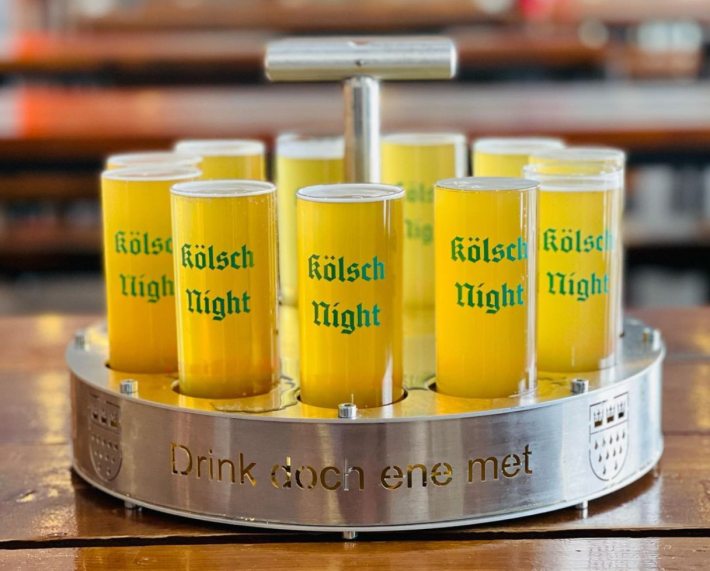
In the months since Wild Mind hosted that first Kölsch service, a number of other local breweries have begun to celebrate the style. Another early adopter was Maple Grove’s OMNI Brewing Co., which hosted its first Kölschfest in June of last year.
At the time, “We were having a lot of discussions about the types of events we do and what’s successful and what works—what we get excited about, and what our customers get excited about,” says Zack Ward, OMNI’s founder and COO. They wanted to introduce a flagship event not unlike Oktoberfest—“where it’s about the beer, and it’s about coming together, which is kind of why we started this place”—but that would celebrate a different season.
A number of OMNI staffers had been to Köln, and so they decided on Kölschfest, a day-long Kölsch blowout in the beer garden where guests could experience traditional service. The festival celebrated its second-annual iteration earlier this month.
The festivities haven’t been without stumbling blocks. Ward had no trouble sourcing the stangen, but the kranzes were a different story—those that were available online were a minimum of $70 used, and already plastered with the names of assorted German breweries. Ever the problem solver, Ward made them in his garage out of random hardware and deep-dish pizza trays. “It was quite the project, but they turned out pretty well,” he chuckles.
Wild Mind was able to track down someone to make their kranzes on Etsy with fairly little trouble, but Zimmerman says it’s a hurdle Dual Citizen hit when they introduced a biweekly Sunday Kölsch service last August. In their case, the father of an employee made them.
“It took some convincing with the bartenders as well,” Zimmerman says of the service. “It was like, ‘So this is what I want to do,’ and they were like, ‘I hate you.’” But Sundays aren’t traditionally a huge day at the brewery, and the sentiment started to shift when bigger crowds of Kölsch-curious visitors began wandering in.
Here in the Twin Cities, Kölsch service differs a little from brewery to brewery. Wild Mind’s quarterly Kölsch nights are more traditional: Kölsch is the only beer on tap, and everyone at every table is drinking it. At Dual Citizen and OMNI—the latter of which is offering Monday-Thursday Kölsch service for the whole month of June—you can get service at your table, but the rest of the taps are flowing for other customers, who order at the bar. Fair State Brewing Cooperative in northeast Minneapolis introduced the service to complement their new Kölsch, Köld, in March, and it’s a daily affair—but only for the folks sitting at the bar.
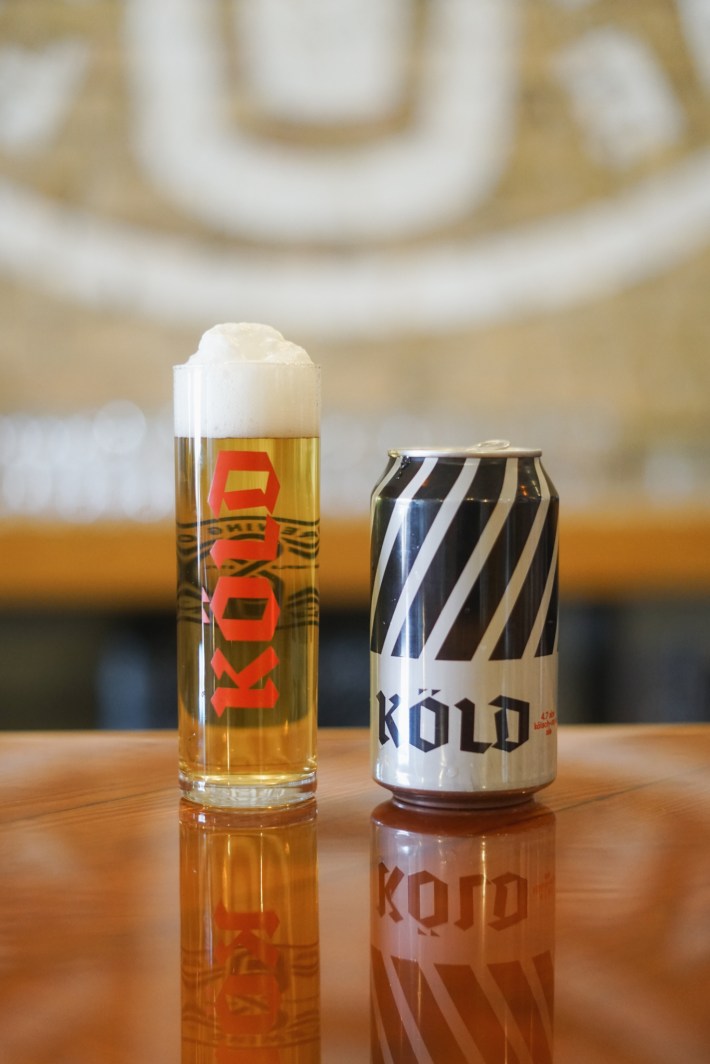
One thing that’s been consistent from brewery to brewery? The popularity of Kölsch service.
“It’s kind of an ideal drinking scenario,” says Fair State head brewer Joe Wells. Everyone can drink at their own pace, and there’s no need to flag down a server or interrupt the conversation to approach the bar. The small serving sizes and low ABV make it easy to drink just a few—or 14—over the course of an afternoon with friends. (The coasters at Dual Citizen are marked with numbers up to 30, the equivalent of about 13 pints; Zimmerman says no one has finished one out yet.) And the prices are low, typically around $3 per pour, or, at Fair State, $6 for the first pour and then $2 after.
“I think one of the things that U.S. beer culture kind of lacks is that formality of service,” says Wells. In countries that have been brewing beer since the Middle Ages, like Germany, the drinking culture is a little more established, and traditions, like Kölsch service, are cherished. That contrasts starkly with the relaxed and relatively young beer culture we have here.
But Kölsch service is one more formal drinking custom that Wells thinks can easily be adapted into U.S. breweries, particularly those in the Midwest. “Because everybody loves a deal,” he says, “and the idea that you’re drinking these little glasses that are very reasonably priced, and you’re gonna drink a lot of ‘em—it just translates well.”
OMNI’s Ward calls Kölsch a real “brewer’s beer,” and Myhran at Wild Mind agrees: “It’s something that I think a lot of us put on so we can drink it after our shift.”
At Dual Citizen, Zimmerman says it’s a consistent favorite among brewers and bartenders alike. “We had to cut them off for a while, they drank a full half-barrel in like four days,” he laughs. (In fairness, adds Wells, “Any time you have a beer that’s below 5% alcohol, and it’s light and crispy and hoppy, that’s a brewer’s beer.”)
From a business standpoint, Kölsch is also kind of a no-brainer: cost-effective, time-efficient, and space saving. It doesn’t require a ton of hops, and many breweries are already using Kölsch yeast for their lagers and IPAs.
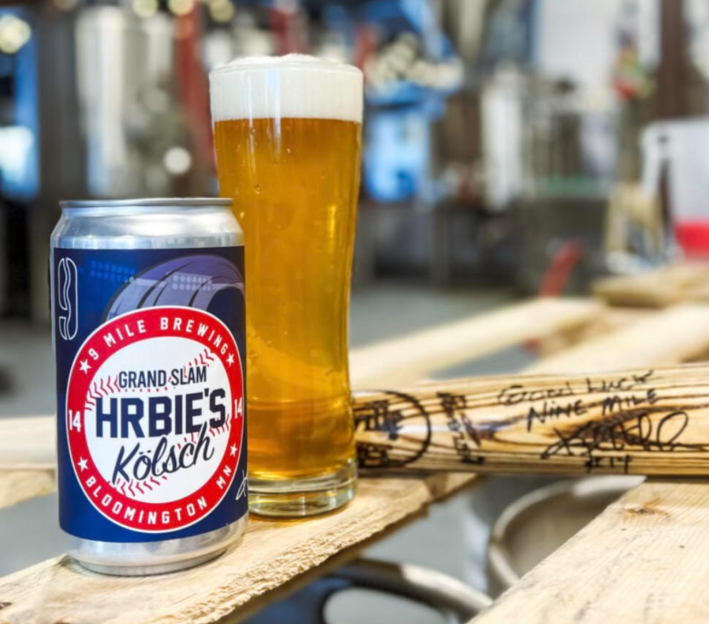
“Like a good lager, there’s not much to a Kölsch—it’s very simple ingredients,” says John Leingang, head brewer at the new Nine Mile Brewing in Bloomington, where their Kölsch, Hrbie's Grand Slam (named for and brewed in partnership with Bloomington’s own Kent Hrbek) has been a huge hit. “They’re light, they’re refreshing—and they don’t take as long to ferment as a lager does,” he continues. “It’s a way to get something nice and crisp on that’s approachable, or close to a lager, without having to actually ferment a lager.”
Leingang says that Nine Mile customers tend toward light beers anyway: “The Kölsch really does well when it’s on tap.”
“Kölsch is something that you can do that doesn’t take two months,” adds Myhran. “You can do it in the amount of time that, for a lot of small breweries, is more appealing to them, just for tank space and everything else.”
As popular as the service has been for local breweries, the style remains largely uncommon (and unpopular) here in the United States. Writing for Brewing Industry Guide last year, former Racket beer columnist Jerard Fagerberg noted that Kölsch is the second-lowest selling craft style in the U.S.
The timing could be right for a Kölsch comeback. In the midst of a craft lager boom, local brewers say they’re seeing people moving away from hoppy hazebois and high-octane beers towards lighter, crisper, more drinkable and sessionable beers. Beers that taste like beer, in other words. Beers like Kölsch.
Even with its budding popularity, Kölsch is still kind of a fringe beer. “Your average customer doesn’t have a clue what Kölsch service is, or what a stange is, or any of that kind of stuff,” says Ward at OMNI. It’s part of the reason so many breweries offer their other beers while they do traditional Kölsch service rather than turning the taproom over to Kölsch alone; they don’t want to alienate anyone who isn’t into it. “But we kind of view it as, you know, it might take us five years to get there,” he says. “But we think people will appreciate the style and appreciate the nod to Cologne.”
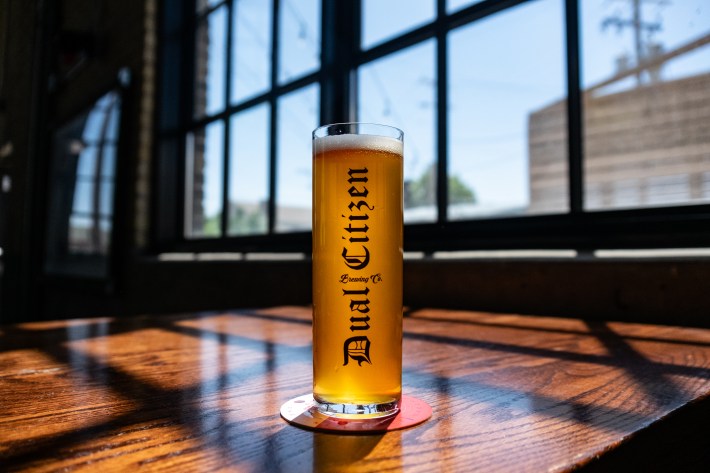
And more breweries are jumping on board. At Nine Mile, they’ve talked about having a big Kölsch party to correspond with the Twins’ home opener next year. Dual Citizen is in the process of moving into a new, and much larger, production facility with a big parking lot that would be perfect for an outdoor Kölsch festival. In addition to daily service, Fair State has been hosting monthly taproom-wide Kölsch events; the next one is on June 25.
Even if Kölsch never hits that frenzied pitch of consumption like hazy IPAs, Wells at Fair State thinks it’s been fun to see traditional service take off. They’ve invested pretty heavily in the brand—printed cans, cardboard cartons—and he says Köld will be a year-round beer for them for a while to come. “It balances what consumers want with what we can produce well, at volume,” Wells says. “It really fits a niche for us as a company, and also us as beer drinkers. It’s kind of the perfect beer for us right now.”
“I mean, Kölsch is dope,” he concludes. “Everybody should be drinking Kölsch, and they should be drinking it properly.”
